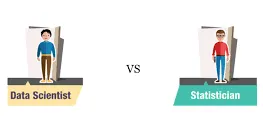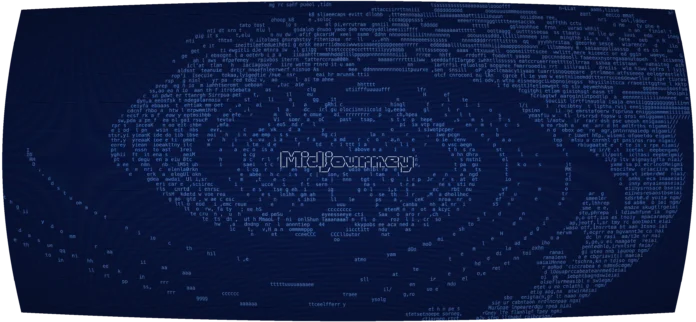Introduction
Statistics can be traced back to the mid-18th century, while Data Science is a relatively new concept. The term Data science was created in the 1960s and is deeply rooted in statistics but now has evolved into artificial intelligence, machine learning, etc.
Data science has seen drastic growth due to the exponential development of the internet. The data science industry is constantly evolving as more and more businesses seek to increase their sales and profits. This makes it both rewarding and demanding for its practitioners to constantly evolve and come up with new ideas and ways to collect, store and analyze data.
Due to the high demand for data scientists, the demand for statisticians has significantly reduced. And if you are looking to change your career from a statistician to a data scientist, you have reached the right place.
I hope that by the end of this article, you will learn the similarities and differences between a data scientist and a statistician, what additional skills you would be required to learn as a data scientist, and which courses you could take to become a successful data scientist.
In the true words of a “know-it-all” Mr. Sherlock Holmes, “It is a capital mistake to theorize before one has data.”
Let’s gather all the data before you take the necessary steps required to become a data scientist.

Before dwelling further, let’s look at the differences and similarities between a statistician and a data scientist.
Table of Contents
Similarities Between a Statistician and a Data Scientist
People often say that there is a vast difference between a Data Scientist and a Statistician, that is true, but there are also a few similarities between the two.
- Strong Statistical Skills: Both data scientists and statisticians have a deep understanding of statistical concepts and methods. They use a combination of mathematical, statistical, and software skills to identify patterns, relationships, and trends in data.
- Proficiency in Programming: Both data scientists and statisticians need to be proficient in programming languages like R, Python, or SAS. They use these languages to manipulate and analyze data.
- Expertise in Data Modeling: Both data scientists and statisticians have expertise in data modeling, which involves developing mathematical models to describe the relationships between variables in a dataset.
- Attention to Detail: Both data scientists and statisticians require attention to detail in their work, as they need to ensure that their data is accurate and their analyses are appropriate.
- Problem-solving Skills: Both data scientists and statisticians need to be able to solve complex problems and develop innovative solutions to data-related challenges.
- Data Extraction Technique: Both data scientists and statisticians design and implement data extraction techniques to locate and obtain useful data and thus share various skills, including the ability to find data, employ analysis, understand trends, and create visualizations.
- Same Goal: Both data scientists and statisticians work closely with data to better understand the past and the present and based on those, they make predictions about the future which would lead to a company’s success.
Now that we have had a look at the similarities, let’s look at the differences now.

Differences Between a Statistician and a Data Scientist
Being a Data Scientist and a Statistician is like comparing apples and oranges. So, let’s compare them.
| Parameters | Statistician | Data Scientist |
| Traditional vs. Modern | Statistics, with its well-established theories and more traditional roots, has its applications rooted in smaller-scale methods of data collection like surveys, polls, etc. | Data Science, with its more digitized and globalized roots, collects huge amounts of data from various sources such as social media monitoring, online tracking, recommendations, etc. |
| Usage of Data | Statisticians use the data collected to provide insights and explanations for a specific phenomenon. | Data scientists use the collected data to predict the outcomes of a certain phenomenon. |
| What they work with | Statisticians typically work with numerical variables and categorical variables, so the information that can be stored is small. | Data Scientists work with varied variables like text, voice, image, video, etc., which take up astronomical space. |
| Time Consumption | Statisticians are provided with tidy data, so they typically spend the majority of their time constructing models rather than cleaning data. | Data Scientists are provided with imperfect data and have to spend a considerable amount of time preprocessing and wrangling the data before feeding them into the model. |
| Methods and Tools | Statisticians use statistical methods like hypothesis testing, deviation, inferential analysis, etc, to analyze and interpret data. | Data scientists use a variety of tools and techniques, including machine learning algorithms, statistical analysis, and data visualization, to analyze and interpret data. |
| Models | Statisticians rather work to improve a single, simple model to best fit the data. | Data scientists focus on comparing several different methods to create the best machine-learning model. |
| Educational Background | Statisticians usually have a mathematics background. | Data scientists tend to come from engineering backgrounds. |
| Business Acumen | Statisticians may focus more on technical analysis. | Data Scientists are expected to have business insight. |
Just to elucidate, there may be times when a data scientist would need help with certain data sets from someone with a background in statistics, and at the same time, a statistician may also need help from a data scientist when they have huge amounts of data with many different variables.
Having a strong foundation in statistical knowledge is always a plus point!
Types of Data Scientists
Before kickstarting your career, let’s get to know about what all types of data scientists are there.
Data science has invaded almost all domains of life, from the e-commerce industry to the manufacturing industry to the healthcare industry. With the growing popularity of data science, job roles suited to the various domains have also emerged, such as actuarial scientist, business analyst, data engineer, data mining expert, data quality analyst, cloud computing expert, software programming analyst, and many more.
For a Data Scientist, your career would look something like this-

Additional Skills Required to Become a Data Scientist
In addition to your statistical skills, to become a successful data scientist, you would need to have the following skills-
- Programming Skills: One must know Python, R, and SQL programming languages to have a better command, as these are the most popular and well-used programming languages for data science.
- Business Knowledge: A good understanding of business strategy will be an integral part of the job to becoming a skilled Data Scientist.
- Cloud Computing: Unlike how Statisticians are used to storing their data on their computer, as a Data Scientist, you would need to store your data on the cloud. Thus, having an understanding of the basic principles of how it works can be a useful skill for data scientists.
- Out-of-the-box Thinking: As a Data scientist, you would need to be open to new ways of thinking as it may lead to new insights.
Courses to Take to Become a Data Scientist
To get an edge over other Data Scientists, one must consider doing the following courses-
- IIT Madras CCE offers Advanced Data Science Certification over the duration of 7 months at Rs 5,500/- per month, where an individual will learn how to master all the necessary skills required, like Machine Learning, Deep Learning, Artificial Intelligence, etc.
- Introduction to AI and ML by Analytics Vidhya
- IIM Kozhikode also offers Certification Course in Data Science for Rs 71,750 over the period of 12 weeks for professionals from any domain looking to advance their careers.
- Analytics Vidhya also offers AI & ML Blackbelt Plus Program, where you get one on one mentorship, learn industry-level skills, 50+ real-world projects, dedicated interview preparation, and placement support at just Rs 64,999/-
- IBM also offers a Data Science Profession Certificate course to kickstart your career. It is a free 5-month course where you can learn Python, SQL, data science skills, etc.
- Harvard University, with its Harvard Data Science Certification program, will teach you the fundamentals of Data Science and statistical concepts and learn how to implement machine learning algorithms. It is a self-paced program at $792.8
- Analytics Vidhya also offers a Data Science Immersive Bootcamp, which is a job-guaranteed training program that helps you land your dream job with the top companies at Rs 59,999/- for 8 months. One would get to learn 12+ Data Science tools, practice 30+ mock interviews and 20+ industry projects.
- The University of Michigan teaches you how to study Python programming language to study Data Science over a period of 32 weeks.
Why are Companies Hiring more Data Scientists and not Statisticians?
Now before considering shifting your career, one must be hoping as to why companies are hiring for data scientists jobs as compared to statisticians. Well, the answer is pretty simple.
- In the highly computerized world where everyone is constantly on their phones and laptops, data scientists collect huge amounts of data and with that, they would need the necessary skills required to manage that data, and as we read above, statisticians work with smaller amounts of data and don’t necessarily have the required computing skills.
- Data Scientists also need to have statistical knowledge, and thus, companies see this as a two-in-one offer.
- It’s a common consensus that data scientists tend to be better programmers than statisticians and thus, making them more efficacious for most organizations, where data is unorganized and messy.
- Data scientists have an in-depth knowledge of the business, leading them to be a hot property in today’s world.
- Data scientists, to share their findings with business managers, stakeholders, etc need to have strong communication skills
- Data scientists can understand their customers at a very granular level which helps the company make policies that are best suited for the customer experience leading to an increase in sales and profits.
The above points can be simplified in this sentence:

Conclusion
Data science has seen drastic growth in today’s world and doesn’t seem to stop anytime soon. Take the leap and get the opportunity to learn and grow.
Here are a few more tips you could add to your basket-
- Capitalise on online resources- Many resources are available online, like blogs, YouTube videos, ebooks, audiobooks etc can be taken advantage of to further your skills as a data scientist.
- Dwell into the data science community- Nothing is better than learning from others who are already in the industry, it can be beneficial to your career and help broaden your horizons.
- Networking and Conferences- Getting knowledge online is as important as making connections and attending conferences and events held all the time to learn new things and build professional connections.
- Find a mentor- Having a person with knowledge and the know-how to be a data scientist can be immensely helpful.
Hope with this article, you would have learned:
- The similarities and differences between a Statistician and a Data Scientist.
- Additional skills and courses you would need to become a successful Data Scientist.
- Make your decision for a career change.

